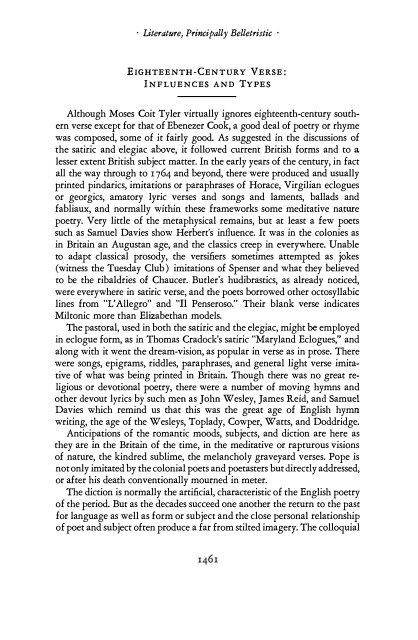Literature, Principally Belletristic - University of Tennessee, Knoxville
Literature, Principally Belletristic - University of Tennessee, Knoxville
Literature, Principally Belletristic - University of Tennessee, Knoxville
You also want an ePaper? Increase the reach of your titles
YUMPU automatically turns print PDFs into web optimized ePapers that Google loves.
· <strong>Literature</strong>,<br />
<strong>Principally</strong> <strong>Belletristic</strong> .<br />
EIGHTEENTH-CENTURY VERSE :<br />
INFLUENCES AND TYPES<br />
Although Moses Coit Tyler virtually ignores eighteenth-century southern<br />
verse except for that <strong>of</strong> Ebenezer Cook, a good deal <strong>of</strong> poetry or rhyme<br />
was composed, some <strong>of</strong> it fairly good. As suggested in the discussions <strong>of</strong><br />
the satiric and elegiac above, it followed current British forms and to a<br />
lesser extent British subject matter. In the early years <strong>of</strong> the century, in fact<br />
all the way through to 1764 and beyond, there were produced and usually<br />
printed pindarics, imitations or paraphrases <strong>of</strong> Horace, Virgilian eclogues<br />
or georgics, amatory lyric verses and songs and laments, ballads and<br />
fabliaux, and normally within these frameworks some meditative nature<br />
poetry. Very little <strong>of</strong> the metaphysical remains, but at least a few poets<br />
such as Samuel Davies show Herbert's influence. It was in the colonies as<br />
in Britain an Augustan age, and the classics creep in everywhere. Unable<br />
to adapt classical prosody, the versifiers sometimes attempted as jokes<br />
(witness the Tuesday Club ) imitations <strong>of</strong> Spenser and what they believed<br />
to be the ribaldries <strong>of</strong> Chaucer. Butler's hudibrastics, as already noticed,<br />
were everywhere in satiric verse, and the poets borrowed other octosyllabic<br />
lines from "1' Allegro" and "n Penseroso." Their blank verse indicates<br />
Miltonic more than Elizabethan models.<br />
The pastoral, used in both the satiric and the elegiac, might be employed<br />
in eclogue form, as in Thomas Cradock's satiric "Maryland Eclogues," and<br />
along with it went the dream-vision, as popular in verse as in prose. There<br />
were songs, epigrams, riddles, paraphrases, and general light verse imita·<br />
tive <strong>of</strong> what was being printed in Britain. Though there was no great religious<br />
or devotional poetry, there were a number <strong>of</strong> moving hymns and<br />
other devout lyrics by such men as John Wesley, James Reid, and Samuel<br />
Davies which remind us that this was the great age <strong>of</strong> English hymn<br />
writing, the age <strong>of</strong> the Wesleys, Toplady, Cowper, Watts, and Doddridge.<br />
Anticipations <strong>of</strong> the romantic moods, subjects, and diction are here as<br />
they are in the Britain <strong>of</strong> the time, in the meditative or rapturous visions<br />
<strong>of</strong> nature, the kindred sublime, the melancholy graveyard verses. Pope is<br />
not only imitated by the colonial poets and poetasters but directly addressed,<br />
or after his death conventionally mourned in meter.<br />
The diction is normally the artificial, characteristic <strong>of</strong> the English poetry<br />
<strong>of</strong> the period. But as the decades succeed one another the return to the past<br />
for language as well as form or subject and the close personal relationship<br />
<strong>of</strong> poet and subject <strong>of</strong>ten produce a far from stilted imagery. The colloquial















